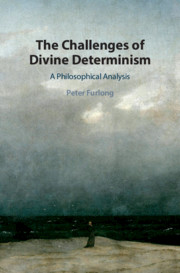Book contents
- The Challenges of Divine Determinism
- The Challenges of Divine Determinism
- Copyright page
- Dedication
- Contents
- Acknowledgments
- Introduction
- Chapter 1 A Primer on Divine Determinism
- Chapter 2 Divine Determinism and Free Will
- Chapter 3 Divine Determinism and Free Will
- Chapter 4 Divine Determinism and the Author of Sin Objection
- Chapter 5 Divine Determinism and the Blameworthiness Objection
- Chapter 6 Divine Determinism and the Free Will Defense
- Chapter 7 God, Determined Agents, and Love
- Chapter 8 Divine Commands, the Divine Will, and Divine Blame
- Conclusion
- References
- Index
Chapter 3 - Divine Determinism and Free Will
Manipulation Arguments
Published online by Cambridge University Press: 07 June 2019
- The Challenges of Divine Determinism
- The Challenges of Divine Determinism
- Copyright page
- Dedication
- Contents
- Acknowledgments
- Introduction
- Chapter 1 A Primer on Divine Determinism
- Chapter 2 Divine Determinism and Free Will
- Chapter 3 Divine Determinism and Free Will
- Chapter 4 Divine Determinism and the Author of Sin Objection
- Chapter 5 Divine Determinism and the Blameworthiness Objection
- Chapter 6 Divine Determinism and the Free Will Defense
- Chapter 7 God, Determined Agents, and Love
- Chapter 8 Divine Commands, the Divine Will, and Divine Blame
- Conclusion
- References
- Index
Summary
In this chapter I continue the task, begun in the last chapter, of considering whether divine determinism undermines human free will. In this chapter I take up manipulation arguments. I begin by focusing on Derk Pereboom’s Four Case Argument. This argument moves from intuitions about cases in which humans are manipulated by other humans to cases in which they are determined by laws of nature, maintaining that the original intuition that the human agent was not morally responsible is preserved even when the case is modified in various ways. I propose a variant of this argument in which the final case involves divine determinism. I also consider an argument that makes a direct appeal to intuition, maintaining that it is obvious that the sort of manipulation involved in divine determinism undermines human moral responsibility. I consider replies to both arguments, noting especially replies that depend upon pointing to the radical differences between God and human manipulators. I close with an investigation of bullet biting in the context of rejecting the truth of common intuitions.
Keywords
- Type
- Chapter
- Information
- The Challenges of Divine DeterminismA Philosophical Analysis, pp. 60 - 85Publisher: Cambridge University PressPrint publication year: 2019

